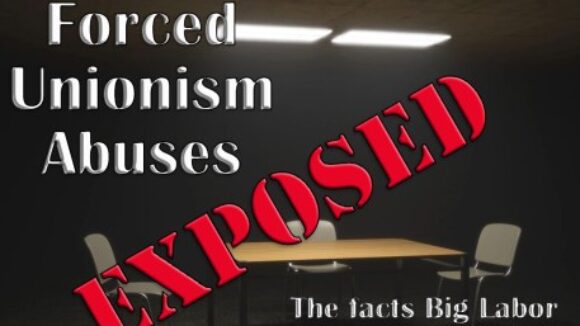Biden Bureaucrats Move to Gut Constitutional Right to Work Protections For Federal Employees
When Right to Work advocates made their first valiant, although diffuse, efforts to stop the spread of government-imposed compulsory union membership…

“[C]ompulsory unionism and corruption go hand in hand . . . .”
— U.S. Sen. John McClellan (D-Ark.)
By the time National Right to Work Committee members receive this edition of Exposed in the mail, a majority of members of the U.S. House of Representatives may have already voted to destroy Right to Work laws currently on the books and in effect in 27 states.
On September 25, the Big Labor-controlled House Education and Labor Committee rubber-stamped the cynically mislabeled “Protecting the Right to Organize” Act, or PRO Act, in a 26-21 vote. The PRO Act, introduced as H.R.2474 in the House and as S.1306 in the U.S. Senate, would foist a forced-unionism regime on the whole nation.
This legislation would empower and enrich union officials at workers’ expense in multiple ways, but its single most outrageous provision would amend the National Labor Relations Act (NLRA) to give private-sector union bosses a green light in all 50 states, including erstwhile Right to Work states, to force employees to pay union fees against their will.
The PRO Act would obliterate state Right to Work protections by inserting a provision in the NLRA stating that the extraction of forced fees from employees for union monopoly bargaining, regardless of whether it benefits or hurts them personally, shall be “valid” notwithstanding “any State or Territorial law.”
More than two-and-a-half million unionized private-sector employees in current Right to Work states who today have a choice about whether or not they bankroll a union they personally may not want, and may never have wanted, could soon be denied a choice if H.R.2474/S.1306 became the law of the land.
And that’s just for starters!
Another PRO Act provision would empower National Labor Relations Board bureaucrats, unilaterally, to overturn secret-ballot votes, handing workers over to Big Labor without so much as a repeat election. Yet another provision would effectively prohibit employers from informing their own employees about the
potential downsides of unionization. The handouts to the union hierarchy in this legislation go on and on and on.
As of the beginning of October, 212 U.S. Representatives had already gone on record publicly as supporters of H.R.2474. That’s just six short of a House majority. A floor vote is expected this fall, and may indeed have already occurred by the time you read this.
Passage of the PRO Act into law would be disastrous for the national economy as well as for employees’ individual freedom.
According to U.S. Labor Department data, over the past decade, the total number of employed people grew more than twice as much, in percentage terms, in the 22 states that had Right to Work laws on the books for the entire 10 years as it did in the 23 states that remain forced-unionism today.
Without Right to Work states, there would certainly be far fewer jobs created in the U.S. as a whole. And job seekers who couldn’t find good-paying jobs in slow-growth forced-unionism states wouldn’t have anywhere to flee.
Of course, the PRO Act is almost certainly not going to become law in the short term — not with Big Labor wielding operational control over just the House at this time and with Donald Trump in the White House.
But the fact that 89% of the House Democrat caucus and 87% of the Senate Democrat caucus have signed on to this extremist bill is alarming. Among S.1306’s Senate sponsors are a number of 2020 Democrat presidential hopefuls, including Sens. Elizabeth Warren (D-Mass.) and Bernie Sanders (I-Vt.). And yet another Democrat presidential frontrunner, former Vice President Joe Biden, has already announced he is in favor of “eliminating” all state Right to Work laws.
Depending on the outcomes of the 2020 presidential and congressional elections, National Right to Work Committee members and other grassroots opponents of compulsory unionism could, within less than a year-and-a-half, face a furious battle to defend Right to Work protections for the roughly half of all private-sector employees across America who benefit from them.
Recently, Right to Work has been on the march. For example, just from 2012 to 2017, with the Committee’s leadership, five states adopted and implemented new bans on forced union dues and fees, raising the total number of Right to Work states to 27. But now a potentially unprecedented Big Labor counterattack is coming. Freedom-loving citizens must prepare themselves for it.#

When Right to Work advocates made their first valiant, although diffuse, efforts to stop the spread of government-imposed compulsory union membership…

Years ago, the ILA was identified by the President’s Commission on Organized Crime as one of a handful of international unions with “histories of control or influence by organized crime.”...

Flight Attendant Triumphs Over TWU Union and Southwest in Suit About Illegal Firing; Jury Awards $5.1 Million in Damages TWU union…